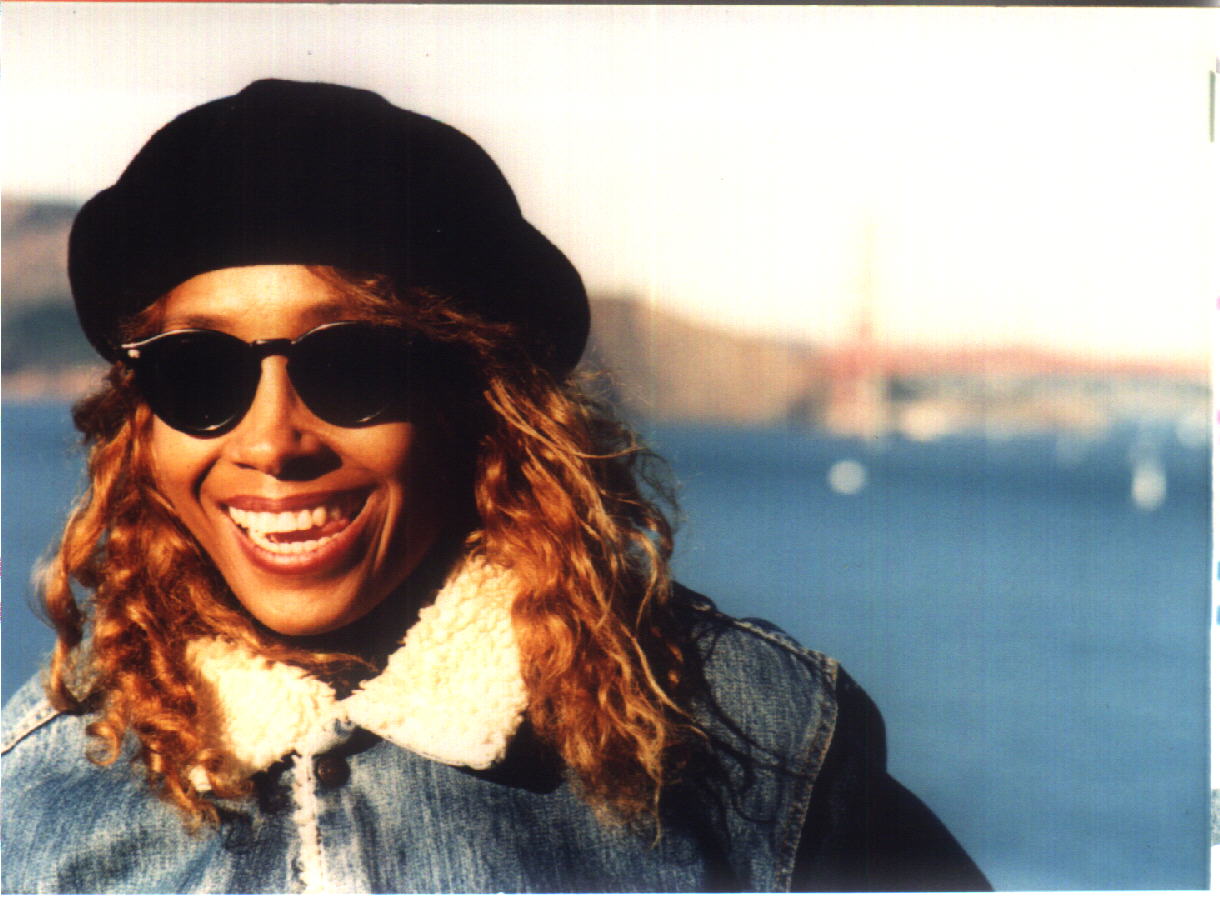


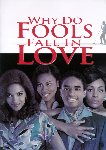 Three
different women married Frankie Lymon. Now as they fight to get a piece
of his millions, They will have to prove who married him first and who
loved him most. Based on a true story of love, music and money.
Three
different women married Frankie Lymon. Now as they fight to get a piece
of his millions, They will have to prove who married him first and who
loved him most. Based on a true story of love, music and money.
Starring Halle Berry, Vivica A. Fox, Lela Rochon
and Larenz Tate Written by Tina Andrews. Directed by Gregory Nava
Website: www.foolsinlove.com
You can't be a teenager forever. That was the case, literally and figuratively, for doo-wop singer Frankie Lymon, whose hits were hot just before Cookie Cutter was conceived back in 1956. You do the math, I've always admitted being an old fogey. Doo-wop was an a capella (no instruments) music that came out of the ghetto at about the same time rock 'n' roll reared its gloriously ugly head. For Cranky, who used to work in the rock 'n' roll biz, these oldies were goodies long before Frankie Lymon met his wretched end, a needle hanging out of his arm. Why Do Fools Fall In Love began it's life as a telling of that side of the story, but ended up as something quite different. Now, usually, the end of the end of August means major pain for those of us who sit in the dark for a living, as this is when films not believed to have potential for big things are usually dumped. Cookie knew that the soundtrack for Why Do Fools Fall In Love, all synched to the original rock recordings, would ease the pain. He wasn't prepared for what can best described as a rock 'n' roll catfight, as the based-on-true story of the battling widows of Lymon plays itself out. If you're not so deep into rap that you can rock to a simpler roll, you'll have a real fine time.
The meteoric rise of Frankie Lymon and the Teenagers, and their equally meteoric fall after the group broke up and Lymon went solo, was a sad enough tale when it was new.
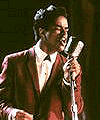 Seen
from the woman's perspective, Frankie Lymon was, at times, a charmer, a
thief, a liar and a manipulative junkie; A wide and wild eyed performance
by Larenz Tate, as Lymon, of a rock 'n' roller burned out at twenty-two
(give or take) keeps you sympathetic to the man who can only see that life
has passed him by when he's still got 60 years coming to him. Recreating
the stage moves for hits like "Why Do Fools Fall In Love,"
Seen
from the woman's perspective, Frankie Lymon was, at times, a charmer, a
thief, a liar and a manipulative junkie; A wide and wild eyed performance
by Larenz Tate, as Lymon, of a rock 'n' roller burned out at twenty-two
(give or take) keeps you sympathetic to the man who can only see that life
has passed him by when he's still got 60 years coming to him. Recreating
the stage moves for hits like "Why Do Fools Fall In Love,"
"Goody Goody" and "I'm Not a Juvenile Delinquent"
from old television tapes, Tate gives a pretty good feel for what the real
act looked like. It must've been something. Let's begin in 1981, when a
Diana Ross cover of the title song sparks images of dollar signs in the
head of convicted prostitute, drug abuser and thief Elizabeth Waters (Vivica
A. Fox), a single (but not legally divorced) mom who 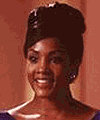 was
rescued from a shoplifting bust by the down but not out Lymon, circa 1961.
was
rescued from a shoplifting bust by the down but not out Lymon, circa 1961.
A demand for dollars brings her to the offices
of Roulette Records prez Morris Levy (Paul Mazursky) who ripped off Lymon
and Co.'s copyrights and made himself wealthy, in the manner of record
execs of the 50s and 60s.  In
the same office at the same time is Zola Taylor (Halle Berry), a writer
and singer with the Platters ("Smoke Gets In Your Eyes" and "The Great
Pretender") who knew Lymon first and married him second. The claws come
out immediately, as the women have known of each other for a long time.
Their Rashoman-like retelling of the story of their first encounter is
a hilarious pairing. Watch for it. Levy's third trump card is a prissy
little Southern school marm, Elmira Eagle (Lela Rochon),
In
the same office at the same time is Zola Taylor (Halle Berry), a writer
and singer with the Platters ("Smoke Gets In Your Eyes" and "The Great
Pretender") who knew Lymon first and married him second. The claws come
out immediately, as the women have known of each other for a long time.
Their Rashoman-like retelling of the story of their first encounter is
a hilarious pairing. Watch for it. Levy's third trump card is a prissy
little Southern school marm, Elmira Eagle (Lela Rochon),  claiming
the gold ring at the time of Frankie's death. Off to court we go, with
the ever lovely Pamela Reed, yes she is, as presiding judge. First on the
stand is the ever boisterous Queen of Rock 'n' Roll, Little Richard, who
begins the narration of Frankie's flashback life, starting with a kinescoped
cameo by rock 'n' roll name-DJ Alan Freed and a recreated television performance
of The Teenager's signature tune.
claiming
the gold ring at the time of Frankie's death. Off to court we go, with
the ever lovely Pamela Reed, yes she is, as presiding judge. First on the
stand is the ever boisterous Queen of Rock 'n' Roll, Little Richard, who
begins the narration of Frankie's flashback life, starting with a kinescoped
cameo by rock 'n' roll name-DJ Alan Freed and a recreated television performance
of The Teenager's signature tune.
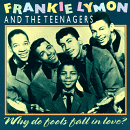 Folks,
if you like the music, you're just gonna love Little Richard as his current
self (Miguel A. Nunez Jr. plays the younger L.R.) telling the history from
a first person perspective. As it moves on, Why Do Fools Fall In Love lays
out more as a tale of three "enemies" finding a common ground and a logical
solution to their mutual problem, and closes down with a nasty, and very
funny, twist. The performances are all very enjoyable, but Vivica A. Fox
takes the cake 'cuz she gets to play the low down and dirty mouthed greedster,
who pulls the "classy" and "glamourous" Berry down into the verbal gutter.
There ain't been a good fight like this since the heyday of Dynasty.
Folks,
if you like the music, you're just gonna love Little Richard as his current
self (Miguel A. Nunez Jr. plays the younger L.R.) telling the history from
a first person perspective. As it moves on, Why Do Fools Fall In Love lays
out more as a tale of three "enemies" finding a common ground and a logical
solution to their mutual problem, and closes down with a nasty, and very
funny, twist. The performances are all very enjoyable, but Vivica A. Fox
takes the cake 'cuz she gets to play the low down and dirty mouthed greedster,
who pulls the "classy" and "glamourous" Berry down into the verbal gutter.
There ain't been a good fight like this since the heyday of Dynasty.
On the scale of Chocolate Chip Cookies...Four
And A Half Chocolate Chip Cookies for...
Why Do Fools Fall In Love. Smooth and satisfying.
the soundtrack alone is worth the price of admission.
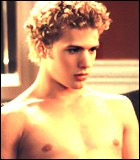 Director
Mark Christopher gives "54" a brisk pace and a colorful, party-like mood
that makes the experience painless and sporadically even enjoyable. Taking
almost the opposite approach that Stillman used in “The Last Days of Disco,”,
Christopher focuses on the ambiance, color, music and costumes of a drug-oriented,
hedonistic subculture but neglects matters of narrative and characterization.
Unlike Stillman, who totally ignored the gay factor, helmer
Director
Mark Christopher gives "54" a brisk pace and a colorful, party-like mood
that makes the experience painless and sporadically even enjoyable. Taking
almost the opposite approach that Stillman used in “The Last Days of Disco,”,
Christopher focuses on the ambiance, color, music and costumes of a drug-oriented,
hedonistic subculture but neglects matters of narrative and characterization.
Unlike Stillman, who totally ignored the gay factor, helmer
Using the format of “Saturday Night Fever,” but without the latter’s emotional honesty and richness of detail, Christopher focuses on a handsome, working-class youngster whose ultimate ambition — and perception of the American Dream — is to leave his drab Jersey City origins and cross the “bridge” to glamorous Manhattan, epitomized in 1979, when the yarn begins, by Studio 54.
In lieu of John Travolta’s blue-collar Italian-American,
here the misunderstood
rebel-hero is Shane O’Shea (Ryan Phillippe),
a naive, 19-year-old Irish-American whose mother died when he was 12 and
who now lives with his severe dad and siblings — he’s close to sister Grace
(Heather Matarazzo). Like many youngsters of his background, Shane arrives
at the disco uninvited and "unprepared,” wearing the wrong outfit (a striped
shirt), but his good looks and charm get him into the club, where he quickly
and willingly absorbs its distinctive norms and values.
The tale concerns Shane’s fast rise from busboy to the “glamorous” job of a shirtless bartender. His mobility puts him in direct competition with his equally ambitious buddy Greg (Breckin Meyer), a handsome busboy who’s too short to work behind the bar. Very much in the manner of “Boogie Nights” (which is set in the same period), the studio and its employees soon become Shane’s surrogate family, particularly co-owner and entrepreneurial spirit Steve Rubell (Mike Myers), who runs the place in the peculiar style of a stern but understanding father.
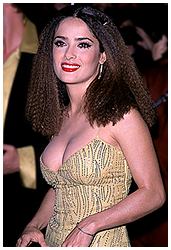 Shane
also befriends Greg’s Latina wife, Anita (Salma Hayek), a coat check girl
who aspires to become a hot disco queen singer. Like “Saturday Night Fever’s”
Tony Manero, Shane is essentially an innocent, good-hearted kid, who aspires
to find his place in the world by hooking with the right crowd, here represented
by an attractive soap star (Neve Campbell), who shows slight romantic interest
in him, and a bunch of Park Avenue types, decadent men and rich, older
women like Billie (Sela Ward).
Shane
also befriends Greg’s Latina wife, Anita (Salma Hayek), a coat check girl
who aspires to become a hot disco queen singer. Like “Saturday Night Fever’s”
Tony Manero, Shane is essentially an innocent, good-hearted kid, who aspires
to find his place in the world by hooking with the right crowd, here represented
by an attractive soap star (Neve Campbell), who shows slight romantic interest
in him, and a bunch of Park Avenue types, decadent men and rich, older
women like Billie (Sela Ward). 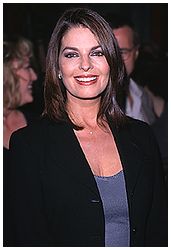 There’s
a sharply observed dinner party scene in which Shane and Anita, totally
out of their element, are embarrassingly unfamiliar with Errol Flynn’s
name when it comes up. Unfortunately, Christopher ignores the interesting
class issue: how blue-collar men could build a career based on their charisma
and sex appeal — at a price.
There’s
a sharply observed dinner party scene in which Shane and Anita, totally
out of their element, are embarrassingly unfamiliar with Errol Flynn’s
name when it comes up. Unfortunately, Christopher ignores the interesting
class issue: how blue-collar men could build a career based on their charisma
and sex appeal — at a price.
The script covers a short period, catching disco in the summer of 1979, at its very height, and observing it through its decline, a year later. All the melodramatic events appear in quick succession in the last reel, beginning with an old woman, Disco Dottie (Ellen Albertini Dow), who O.D.s and dies on the floor; cash money dissappearing; IRS investigations after Rubell’s arrogant pronouncements, and his subsequent arrest and imprisonment.
This by no means suggests that the movie is messy.
Approaching the club as a legit
character, Christopher structures the action
along 10 nights, each illustrating a major theme as the disco devolves
from a celestial paradise to a lost one. To end the film on an upbeat note,
a rather fake coda describes a post-prison homecoming party for Rubell,
and Shane’s “rehabilitation” as a NYU business student.
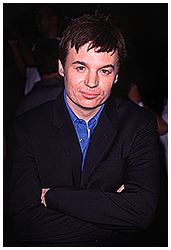 Except
for Myers, who brings an edge and humor to his role, the ensemble is appealing
but undistinctive, mostly due to the shortcomings of the writing. The best
way to experience “54” is to succumb to its exuberant music (a couple of
songs are splendidly performed) and marvel at the ostentatious costumes
(designed by Ellen Lutter), which showcase the crowd as preening peacocks
at a grand costume ball.
Except
for Myers, who brings an edge and humor to his role, the ensemble is appealing
but undistinctive, mostly due to the shortcomings of the writing. The best
way to experience “54” is to succumb to its exuberant music (a couple of
songs are splendidly performed) and marvel at the ostentatious costumes
(designed by Ellen Lutter), which showcase the crowd as preening peacocks
at a grand costume ball.
With the assistance of Alexander Gruszynski’s lurid lighting, this is one big party movie, not as frivolous as Robert Altman’s “Ready to Wear” or as pretentious as Alan Rudolph’s “Mrs. Parker and the Vicious Circle,” but not much deeper either. A more critical and resonant Hollywood movie about the glorious disco culture screams to be made.
On the scale of Chocolate Chip Cookies...Three and a Half Chocolate Chip Cookies for "54"
